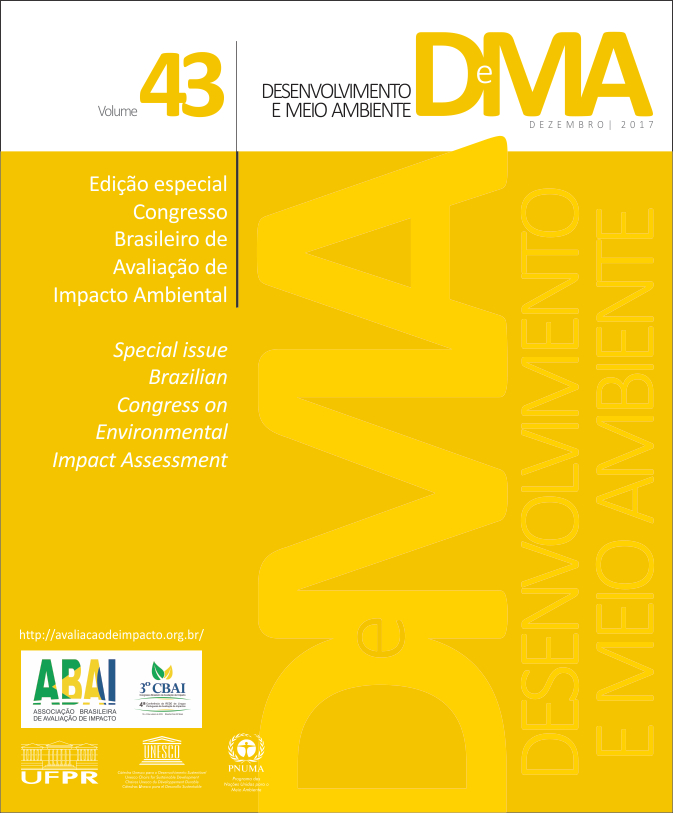A fraca articulação entre planejamento e licenciamento ambiental no Brasil
DOI:
https://doi.org/10.5380/dma.v43i0.54146Palavras-chave:
política ambiental, política urbana, zoneamento ecológico-econômico, plano diretor municipalResumo
A articulação entre planejamento territorial e licenciamento ambiental tem o potencial de beneficiar o licenciamento ao proporcionar agilidade e simplificação de processos, além de ampliar a possibilidade de participação pública. O Brasil adota diferentes instrumentos de planejamento territorial para diferentes recortes territoriais e com diferentes enfoques (ex.: planos de manejo de unidades de conservação; zoneamentos ecológico-econômicos, elaborados principalmente para estados ou regiões; e planos diretores municipais, devendo abranger as áreas urbana e rural dos municípios). Entretanto, muitos dos benefícios da articulação entre estes instrumentos e o licenciamento ambiental ainda não foram alcançados ou nem mesmo são reconhecidos ou valorizados. Buscando contribuir para uma mudança de visão e das práticas neste sentido, o presente trabalho apresenta um panorama sobre os zoneamentos ecológico-econômicos elaborados no Brasil, bem como sobre os planos diretores municipais, e discute se o licenciamento ambiental tem sido abordado nesse contexto. Para o zoneamento ecológico-econômico, foi consultado o sítio eletrônico do Ministério do Meio Ambiente e as informações disponíveis sobre a situação do ZEE no Brasil e, sobre os planos diretores municipais, foram consultados o relatório organizado pelo Observatório das Metrópoles sobre os planos diretores pós-Estatuto da Cidade e o relatório sobre o Perfil dos Municípios Brasileiros, organizado pelo IBGE. Como resultado, observa-se que: (1) dos 58 zoneamentos ecológico-econômicos já concluídos, apenas 21 são normatizados e, dentre estes, 16 mencionam ou atrelam condições para o licenciamento ambiental às suas diretrizes e zonas; (2) em relação aos planos diretores municipais, poucos fazem referência ao licenciamento ambiental ou deixam tal indicação para regulamentação posterior. Conclui-se que, embora o Brasil possua instrumentos de planejamento territorial aptos a trabalhar de forma articulada com o licenciamento ambiental, não há apenas falha no estabelecimento prático desta relação, mas também há lacunas de planejamento territorial, o que dificulta a ampla aplicação destes instrumentos de forma articulada.
Downloads
Publicado
Como Citar
Edição
Seção
Licença
Os Direitos Autorais sobre trabalhos publicados nesta revista são do autor, com direitos de primeira publicação para a revista. O conteúdo dos trabalhos publicados é de inteira responsabilidade dos autores. A DMA é um periódico de acesso aberto (open access), e adota a licença Creative Commons Atribuição 4.0 Não Adaptada (CC-BY), desde janeiro de 2023. Portanto, ao serem publicados por esta Revista, os artigos são de livre uso para compartilhar (copiar e redistribuir o material em qualquer suporte ou formato para qualquer fim, mesmo que comercial) e adaptar (remixar, transformar, e criar a partir do material para qualquer fim, mesmo que comercial). É preciso dar o crédito apropriado, prover um link para a licença e indicar se mudanças foram feitas.
Os conteúdos publicados pela DMA do v. 53 de 2020 ao v. 60 de 2022 são protegidos pela licença Creative Commons Atribuição – Não Comercial – Sem Derivações 4.0 Internacional.
A DMA é uma revista de acesso aberto desde a sua criação, entretanto, do v.1 de 2000 ao v. 52 de 2019, o periódico não adotava uma licença Creative Commons e, portanto, o tipo de licença não é indicado na página inicial dos artigos.




